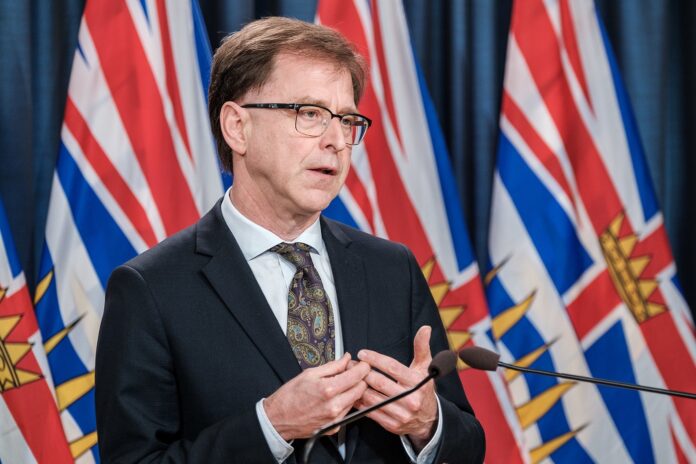Approximately 4,800 patients will benefit from this temporary program over the next two years
TO ensure people have faster access to life-saving radiation treatment, BC Cancer is taking action with measures that reduce wait times and increase capacity into the future.
“Health care in B.C. has always been about one key commitment: getting patients the care they need, when they need it,” said Health Minister Adrian Dix on Monday. “To ensure every effort is being made to get cancer patients the treatment they need, we are temporarily referring patients to clinics across the border. This immediate action will support patients while we expand cancer services and hire more cancer care staff throughout the province.”
To support B.C.’s cancer plan and reduce wait times for radiation treatment, starting May 29, BC Cancer is temporarily offering eligible patients radiation treatment at one of two clinics in Bellingham, Washington. This will launch a temporary initiative outside the province that could support as many as 50 additional radiation patients each week.
“Timely radiation therapy treatment is critical for people with cancer, both for their survival and overall quality of life,” said Dr. Kim Chi, Chief Medical Officer, BC Cancer. “Through this temporary initiative, we can take urgent action to improve outcomes, not only for those who are able to travel but also for people with cancer receiving care at our regional centres. The initiative increases our overall capacity to deliver vital radiation therapy for every British Columbian who needs it.”
Over the next two years, approximately 4,800 patients will benefit from this temporary program, representing approximately 2,400 patients per year. This would provide approximately 24,000 sessions of radiation treatment over the course of the program, or 12,000 sessions per year.
During the same time, B.C. is expecting to see approximately 1,000 new patients requiring radiation treatment. By adding capacity for an estimated 4,800 more patients over the next two years, B.C. is taking action to ensure more people receive their radiation treatment by clinical benchmark. These efforts will help B.C. meet growing demand while creating redundancy to replace equipment and position the province to keep up with demand into the future.
Through BC Cancer and the Provincial Health Services Authority (PHSA), eligible patients will have all costs related to their treatment covered, including travel, meals and accommodation. As a temporary addition to the public health-care system, all costs for medical services, testing and medication related to the patient’s radiation treatment, prescription medications and laboratory testing will be covered by the Province.
“We are incredibly grateful to BC Cancer physicians and staff for their unwavering commitment to patient care in the midst of increased patient loads,” said Dr. David Byres, President and CEO, Provincial Health Services Authority. “This temporary measure will support those facing cancer while we continue our efforts to recruit specialized clinical and support staff, upgrade our infrastructure, and work with our health authority partners to deliver on the priorities in B.C.’s 10-year cancer action plan.”
A BC Cancer support team will help patients by arranging appointments, co-ordinating travel plans and greeting them when they return to their regional BC Cancer centre.
“Being diagnosed with cancer can be overwhelming. We appreciate that travelling for treatment can cause added stress at a difficult time, both for people with cancer and those who care for them.” said Heather Findlay, Chief Operating Officer, BC Cancer. “Our care teams are committed to support patients through every stage of their cancer journey and will ensure their travel is as smooth as possible by supporting with planning and logistics for two people, allowing our patients to bring a loved one with them.”
The Province will continue expanding cancer care through B.C.’s Cancer Care Action Plan to better prevent, detect and treat cancers today, and to meet growing future demand. Through investments in research, technology and innovation, the Province is strengthening cancer care in B.C. and delivering more innovative, evidence-based care for people when and where they need it.
To increase capacity and keep up with demand into the future, the Province is adding more cancer centres across B.C., upgrading existing hospital space through renovation and expansion, including the addition of net new diagnostic imaging equipment, and hiring new physicians and clinical support staff through B.C.’s Health Human Resources Strategy.
Learn More:
To learn more about B.C.’s cancer plan, visit: https://news.gov.bc.ca/
To learn more about B.C.’s health human resource plan, visit: https://strongerbc.gov.bc.ca/
BACKGROUNDER 1
Facts about cancer care in B.C.
* The clinics in Bellingham, Washington, are located at the PeaceHealth St. Joseph Cancer Center and the North Cascade Cancer Center.
* Breast cancer and prostate cancer patients will be the first patient groups eligible to travel to Bellingham for their treatment because they are the largest group of patients receiving radiation therapy.
* In 2021, more than 30,000 people in B.C. were newly diagnosed with cancer.
* Since 2017, B.C. has committed more than $1 billion to support the creation of a strong and sustainable cancer-care system.
* In July 2019, the Province announced the third publicly funded PET/CT scanner in B.C. and the first located in Victoria and outside of the Lower Mainland.
* In August 2020, the Province announced the fourth publicly funded PET/CT scanner in B.C.
* Since 2021, the Province eliminated the 4,000-person waiting list for the Hereditary Cancer Program, launched the Lung Screening Program, and launched the first at home human papillomavirus (HPV) cervix-screening pilots.
* Work is underway to open new cancer centres in Burnaby and Surrey, with more on the way.
* As part of the 70 actions of the Health Human Resource strategy, BC Cancer has recently hired more than 350 full-time equivalent positions, including physicians and clinical support staff, to implement a new team-based care model in all six regional cancer centres.
BACKGROUNDER 2
Details about the Across Borders Cancer Radiation Treatment commitment
Costs related to the following will be fully covered for the patient:
* Travel (regardless of the destination)
* Flight
* Car rental or use of a Personal Motor Vehicle (in alignment with the PHSA’s Travel and Business Expense Policy)
* Train
* Ferry
* Meals (per diem in alignment with PHSA’s Travel and Business Expense Policy)
* Accommodation
* Ambulance fees related to their radiation therapy care
* Laboratory and medical imaging tests during the treatment, excluding genetic testing
* Prescription drugs, including supportive care medications required during the treatment
* Patient immobilization devices required for radiation therapy treatment
* Services provided by non-physician professionals (e.g. registered dietitian, psychiatry)
In addition, the following costs will be fully covered for a caregiver to accompany the patient:
* Travel
* Flight
* Car rental or use of a Personal Motor Vehicle (only if the patient is accompanying them)
* Train
* Ferry
* Meals (per diem in alignment with PHSA’s Travel and Business Expense Policy)
* Accommodation
Patients who wish to receive treatment in Bellingham, as well as their accompanying caregivers, will need to have passports and visas as applicable.
Any emergency (unplanned) treatment and associated hospital costs will be 100% covered for patients requiring unexpected medical care.
For patients who experience these additional health challenges, safely transferring them to a B.C. hospital will occur in collaboration with the regional health authority, BC Cancer and – if necessary – BC Emergency Health Services.














